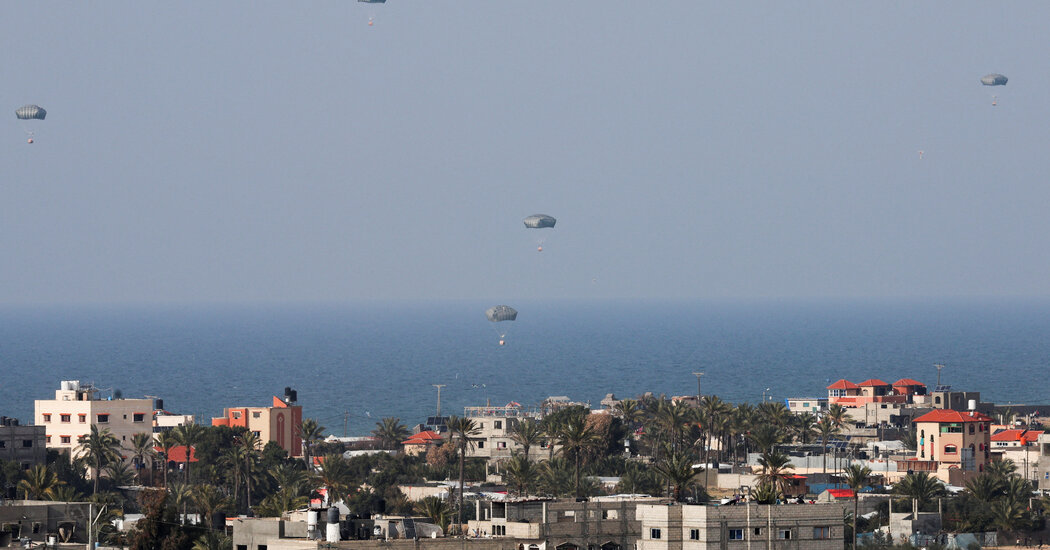Jordan and France airdropped food and other humanitarian aid into Gaza on Monday, bringing a modicum of desperately needed assistance to Palestinians facing looming famine as aid groups warned of growing restrictions on their ability to distribute supplies on the ground.
Three planes from the Jordanian Air Force and one from its French counterpart dropped aid, including ready-made meals, over several sites on the coast of Gaza, the Jordanian Army said in a statement. The French plane dropped more than two tons of food and hygiene supplies, all packed in containers rigged with parachutes, the French foreign ministry said.
Humanitarian groups generally airdrop aid to conflict zones only as a last resort, because airdrops pose significant logistical challenges and safety risks. They are also less efficient and far more expensive than delivering aid by road. The two tons of aid dropped by the French plane, for example, represent far less than the capacity of a single truck and make up only a tiny sliver of the aid needed by the enclave’s more than two million residents.
Still, France, which participated in an earlier airdrop, said it was ramping up its work with Jordan because Gaza’s “humanitarian situation is absolutely urgent,” according to a French foreign ministry statement.
“With a growing number of civilians in Gaza dying of hunger and disease,” the statement said, “France stresses the urgent, imperative need to open the port of Ashdod, all border crossings and a land corridor from Jordan, which could be another effective way to ensure massive deliveries of humanitarian aid to Gaza.”
Jordan began airdropping aid in November and has completed more than a dozen missions since, largely to resupply its field hospitals in Gaza. At least one airdrop mission was jointly carried out with France in January, and two others delivered aid supplied by the Netherlands and Britain.
Calls for internationally coordinated airdrops have intensified as aid groups simultaneously warn that the hunger crisis in Gaza is reaching a tipping point and that some obstacles to traditional aid distribution have become insurmountable.
Last week, the World Food Program suspended food deliveries to northern Gaza, saying that despite extreme needs there, it could not safely operate amid gunfire and the “collapse of civil order” in recent days. The W.F.P. and other United Nations aid agencies have repeatedly warned that their access to northern Gaza was being systematically impeded by Israeli authorities, calling on the government to ease its restrictions. Israel has denied blocking aid deliveries.
The suspension of W.F.P. deliveries in an area where they are needed most indicates that, despite their many limitations, airdrops may be one of the few viable options remaining to quickly get food to northern Gaza, according to Ahmed Fouad Alkhatib, a Middle East policy analyst who grew up in the enclave. Jordan’s airdrops, he said, have set a “critical precedent” for the feasibility of the approach.
“Simply wishing for a cease-fire or simply wishing for better Israeli cooperation” is not enough, Mr. Fouad Alkhatib said. “We need action right now.”
